Omega and Essential Fats
Omega-3, 6, and 9 fatty acids help support heart, brain, and joint health. As the body can’t produce these, supplements like fish oil are beneficial.
43% OFF
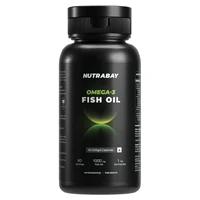
Nutrabay Fish Oil Omega 3 - 1000mg
₹319
MRP: ₹569
Add37% OFF
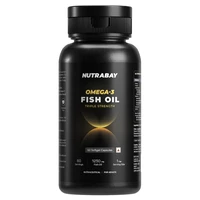
Nutrabay Fish Oil Omega 3 (triple Strength) - 1250mg
₹749
MRP: ₹1,199
AddUpto 52% OFF

Naturaltein Ultimate Omega 3
From
₹529
MRP: ₹1,000
Add
30% OFF
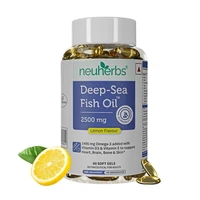
Neuherbs Deep Sea Omega 3 Fish Oil 2500mg (triple Strength) With Vitamin D3 & E
₹699
MRP: ₹999
AddUpto 31% OFF

Muscleblaze Fish Oil 1000mg
From
₹449
MRP: ₹609
Add
31% OFF

Muscleblaze Omega 3 Fish Oil Gold 1250mg - Triple Strength Formula (560mg Epa & 400mg Dha)
₹827
MRP: ₹1,209
Add26% OFF
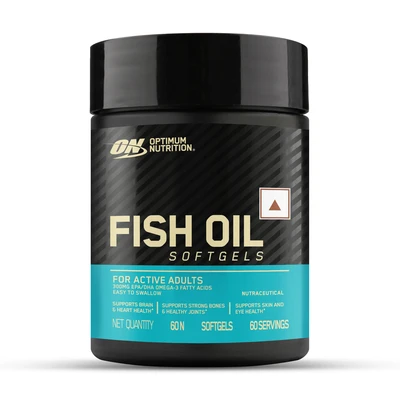
Optimum Nutrition (on) Fish Oil
₹488
MRP: ₹666
AddUpto 57% OFF

Naturaltein Algae Source Ultimate Vegan Omega 3 500mg
From
₹549
MRP: ₹1,000
Add
39% OFF

Muscletech Platinum Fish Oil
₹799
MRP: ₹1,329
Add48% OFF

Pole Nutrition Omega 3 Fish Oil 1000mg
₹799
MRP: ₹1,549
Add29% OFF

Gnc Triple Strength Fish Oil Softgels
₹850
MRP: ₹1,199
AddUpto 32% OFF

Tata 1mg Salmon Omega 3 Fish Oil
From
₹422
MRP: ₹595
Add
39% OFF

Tata 1mg Triple Strength Omega 3
₹662
MRP: ₹1,100
Add58% OFF

Naturaltein Omega 3 Single Strength
₹499
MRP: ₹1,200
Add68% OFF

Sunline Alaska Deep Sea Fish Oil Omega-3
₹749
MRP: ₹2,399
Add39% OFF
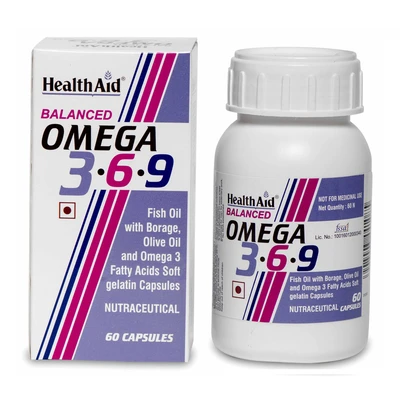
Healthaid Balanced Omega 3.6.9
₹1,149
MRP: ₹1,900
Add24% OFF
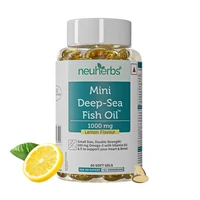
Neuherbs Mini Deep Sea Omega 3 Fish Oil 1000mg With Vitamin D3 & E
₹399
MRP: ₹529
Add
Dr. Morepen Omega 3 6 7 9 Vegetarian Capsules 500mg
₹426
MRP: ₹439
Add26% OFF

Dr. Morepen Omega 3 Deep Sea Fish Oil Triple Strength, 1250mg With 750mg Dha & Epa
₹712
MRP: ₹975
AddUpto 15% OFF

Swisse Ultiboost Odourless High Strength Wild Fish Oil With (1500 Mg)
From
₹722
MRP: ₹849
Add
19% OFF

Gnc Fish Oil 1000mg
₹566
MRP: ₹699
Add18% OFF
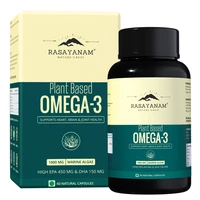
Rasayanam Plant Based Omega 3 1600mg
₹979
MRP: ₹1,199
AddUpto 39% OFF

Vlado’s Himalayan Organics Vegan Omega 3 With 3 6 9
From
₹609
MRP: ₹999
Add
25% OFF
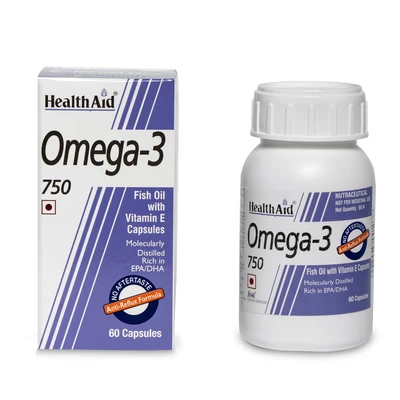
Healthaid Omega 3 750mg (epa 425mg, Dha 325mg)
₹1,568
MRP: ₹2,100
Add56% OFF

Healthyhey Nutrition Triple Strength Omega 3 Fish Oil
₹533
MRP: ₹1,239
Add29% OFF
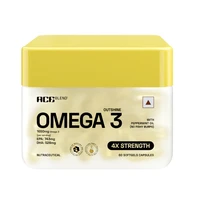
Ace Blend Outshine Omega 3 1650mg
₹993
MRP: ₹1,399
Add34% OFF

One Science Nutrition Omega 3 Alaska Fish Oil
₹989
MRP: ₹1,499
Add20% OFF

Velbiom Happy Cultures 5x Omega 3 Fish Oil | Omega 3 Supplement 5x Strength 2600 Mg
₹790
MRP: ₹999
Add15% OFF

Swisse Ultiboost Odourless 4x Strength Wild Fish Oil Supplement
₹2,294
MRP: ₹2,699
Add43% OFF

Kaged Muscle Omega 3
₹2,834
MRP: ₹4,999
Add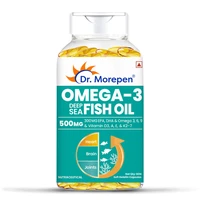
Dr. Morepen Omega 3 Deep Sea Fish Oil 500mg With 300mg Dha & Epa
₹461
MRP: ₹475
Add42% OFF

Dr. Morepen Multivitamin Men (60 Softgel) + Omega 3 Triple Strength Fish Oil (60 Softgel)
₹1,057
MRP: ₹1,850
Add45% OFF

Healthaid Flaxseed Oil 1000mg (omega 3.6.9)
₹896
MRP: ₹1,650
Add33% OFF
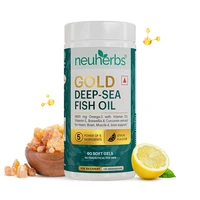
Neuherbs Gold Deep Sea Omega 3 Fish For Men & Women With Vitamin D3 & E
₹999
MRP: ₹1,499
Add25% OFF

Tata 1mg Cod Liver Oil
₹265
MRP: ₹355
Add40% OFF
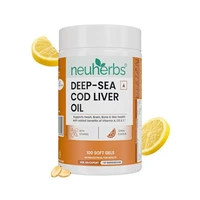
Neuherbs Deep Sea Omega 3 Cod Liver Oil 600mg With Vitamin A, D3 & E
₹299
MRP: ₹499
Add16% OFF

Dr. Morepen Omega 3 Deep Sea Fish Oil
₹461
MRP: ₹549
Add41% OFF
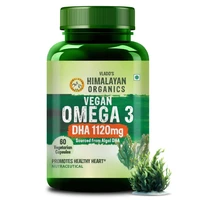
Vlado's Himalayan Organics Vegan Omega 3 Dha 1120mg
₹848
MRP: ₹1,449
Add36% OFF
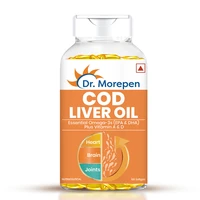
Dr. Morepen Cod Liver Oil Capsules With Natural Omega 3, Vitamin A & D
₹383
MRP: ₹599
Add25% OFF
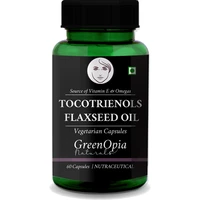
Greenopia Tocotrienols Flaxseed Oil
₹1,199
MRP: ₹1,599
Add
- 1
- 2
What is Omega-3?
Omega-3 is a type of essential fatty acid. Since our body can not make it, we must obtain it through diet or supplements.
Omega-3 fatty acids are good polyunsaturated fats and provide numerous health benefits. Some common omega-3 foods are fatty fish like salmon, sardine, cod, mackerel, krill, flaxseeds, walnuts, spirulina, and chia seeds.
Omega-3 fish oil supplements are a great and effective alternative for people who do not prefer these dietary sources.
Omega-3: Benefits & Uses
Lets us discuss omega-3 fatty acid benefits for our health.
- Boost Heart Health:Omega-3 fatty acids play a vital role in keeping your heart healthy. They help manage blood cholesterol levels and inhibit the levels of "bad" or LDL cholesterol from rising. High cholesterol levels mean higher chances of coronary heart disease. They prevent our blood vessels from getting blocked and reduce the risk of heart disease or strokes.
- Minimize Muscle Soreness:If you are a gym-goer, athlete, or bodybuilder, omega-3 fatty acids are perfect for getting rid of post-exercise muscle soreness. Studies have shown that EPA and DHA fatty acids help reduce muscle stiffness and soreness and promote faster recovery.
- Reduce Joint Pain:Studies suggest that Omega-3 fatty acids are potent anti-inflammatory that help reduce joint pain and stiffness. Omega-3 fatty acids supplementation benefits people with joint pain, arthritis, and Rheumatoid Arthritis (RA).
- Cognitive Health:Omega-3 fatty acids, especially DHA, are considered beneficial for our brain health. They boost brain development, learning, memory, and overall mental health.
- Sleep Quality:If you experience trouble sleeping, you might be omega-3 deficient. Omega-3 fatty acid DHA is linked with melatonin, a sleep hormone. Lack of omega-3 is associated with an increased risk of sleep issues. So you can include omega-3 fatty acids foods or omega-3 capsules in your diet to improve sleep health.
- Vision Health:Omega-3 fatty acid DHA forms an essential structural component of the retina; therefore, it is necessary for eye health. Lack of omega-3 fats increases the chances of macular degeneration, which reduces vision and can cause complete blindness in severe cases.
The omega-3 benefits list doesn't end here. Studies show that they are also helpful for strong bones and improve skin health. They also reduce anxiety, symptoms of Attention Deficit Hyperactivity Disorder (ADHD), a behavioural disorder in children, the risk of prostate cancer, and lessen the chance of metabolic conditions like obesity and diabetes.
Omega-3 Types:
Omega-3 fatty acids are of three types:
Alpha-Linolenic Acid (ALA)
This omega-3 fatty acid is present in plant-based omega-3 sources like chia seeds, walnuts, flaxseeds, soybean, and canola oil. Our body uses ALA for energy production. ALA gets converted to EPA for utilization, but the conversion rate is less.
Docosahexaenoic Acid (DHA)
The most important omega-3 fatty acid is primarily found in fatty fish and fish oil capsules. It is a chief structural component of the brain, the retina, and various other body parts. People who do not eat fish can opt for omega-3 supplements.
Eicosapentaenoic Acid (EPA)
Major sources of omega-3 fatty acids EPA are fatty fish, omega-3 eggs, and fish oil pills. EPA fatty acid can prevent blood from clotting easily and reduce triglyceride levels, pain, and swelling.
How to choose the right Omega-3 for you?
If you plan to buy an omega-3 supplement, here are some of the key points to consider.
- Check the source of omega-3 fatty acids. For example, go for algal oil if you want a vegan or plant-based omega-3 supplement.
- Check Omega-3 fatty acid content per serving and the ratio of EPA and DHA. If you are an active athlete or bodybuilder, omega-3 fish oil capsules with triple strength are more beneficial.
- Omega-3 fatty acids supplements should be certified and free from heavy metals like mercury, arsenic, lead, and cadmium.
- The product should be fresh as oil may turn rancid. Therefore, check the date of manufacture and expiry.
In case of any confusion, seek medical advice.
How to use Omega-3?
One can take Omega-3 tablets or capsules at any time of the day, preferably with meals. To avoid fishy burps or aftertaste, buy omega-3 pills or enteric-coated soft gels.
Where to Buy Omega-3?
You can visitNutrabay.comto explore the best omega-3 capsules in India. We procure the products directly from brands or official importers. So for a hassle-free buying experience, secure online payment options and grab affordable omega-3 capsules price, visit Nutrabay.
Which is the best Omega-3?
Omega-3 requirements are different based on age and physical activity levels. Nutrabay has the best omega-3 fatty acid capsules for all.
- Nutrabay Pro Fish Oil Omega 3 (Triple Strength):It is the best omega-3 supplement for people with an active lifestyle and involved in intense workouts. Each serving provides 1000mg with triple the strength of EPA and DHA. Perfect for combating everyday fatigue effectively, facilitating lean mass gain, and minimizing injury risk during heavy workouts.
- Nutrabay Wellness Fish Oil Omega 3:The best wellness omega-3 supplement to fulfill daily needs and maintain overall vitality. It provides 1000mg of omega-3 per capsule with an ideal EPA and DHA ratio. One can consume it to enjoy omega-3 capsules benefits like weight loss, healthy heart, joint, muscle and immunity. It is available at an affordable Omega-3 price.
Is Omega-3 safe to use?
Omega-3 supplements are safe to consume by anyone, including children and older adults. However, the dosage might vary depending on the requirement.
There are no known severe Omega-3 side effects. Pregnant, lactating women and people with prevailing medical conditions should always seek advice from a doctor.
People who are allergic to fish should be cautious. Omega-3 fatty acids tablets might interfere with certain medications like blood thinners, anti-coagulants, and blood pressure medications. In addition, they might worsen symptoms among people with severe acid reflux issues.
Frequently Asked Questions (FAQs)
1.Can I consume Omega-3 supplements daily?
One can consume Omega-3 supplements daily for overall well-being and maintain a healthy Omega-3:6 ratio in the body. However, asking an expert to determine a safe limit is advisable.
2.What are the common signs of Omega-3 deficiency?
Skin dryness, dry eyes, joint pain, hair loss, fatigue, excessive ear wax, trouble in sleep, depression, mood fluctuations, and poor concentration are common symptoms of Omega-3 deficiency.
3.How much Omega-3 can I consume per day?
For dietary intake, American Heart Association recommends eating two servings of fatty fish per week.
There are no recommended allowances for Omega-3 supplements, but numerous studies have determined a safe dosage due to the potential omega-3 fish oil benefits.
- For general well-being, an Omega-3 dosage of 1000mg per day with EPA and DHA in the ratio of 3:2 is beneficial.
- For people with Rheumatoid Arthritis (RA), 3000 mg of omega-3 fats per day effectively reduces inflammation.
- For athletes and active people, 1500-2000 mg of omega-3 fats per day reduce soreness, strengthen joints and reduce the risk of injury. Pro athletes can also opt for triple-strength fishoil capsules.
- For kids, 500 mg of omega-3 fats per day is sufficient to meet their developmental needs.
- Pregnant and lactating women should consult their gynaecologists to establish a suitable dosage.
No harmful consequences have been noted for a maximum intake of 5000 mg of omega-3 fats per day.
4.Is it necessary to take Omega-3 supplements?
Our body essentially requires Omega-3 fatty acids. Plant-based omega-3-rich foods like walnuts, chia seeds, flaxseeds, and edamame also contain omega-3 fats in the form of Alpha-Linolenic Acid (ALA). Our body converts ALA into the EPA or DHA for its utilization, but the conversion rate is less (approx. 15%). Due to this, vegetarians often lack omega-3 in their diet. Omega-3 fish oil provides an extra edge over plant-based sources, as the bioavailability is high.
Moreover, fish consumption in a diet daily might be challenging. Therefore, fish oil supplements are a must-buy to prevent nutritional inadequacy and keep our organs like the brain, heart, eyes, and skin healthy.
- Nutrabay Fish Oil Omega 3 - 1000mg₹319
- Nutrabay Fish Oil Omega 3 (Triple Strength) - 1250mg₹749
- Naturaltein Ultimate Omega 3₹529
- Neuherbs Deep Sea Omega 3 Fish Oil 2500mg (Triple Strength) With Vitamin D3 & E₹699
- MuscleBlaze Fish Oil 1000mg₹449
- MuscleBlaze Omega 3 Fish Oil Gold 1250mg - Triple Strength Formula (560mg EPA & 400mg DHA)₹827
- Optimum Nutrition (ON) Fish Oil₹488
- Naturaltein Algae Source Ultimate Vegan Omega 3 500mg₹549
- MuscleTech Platinum Fish Oil₹799
- Pole Nutrition Omega 3 Fish Oil 1000Mg₹799




